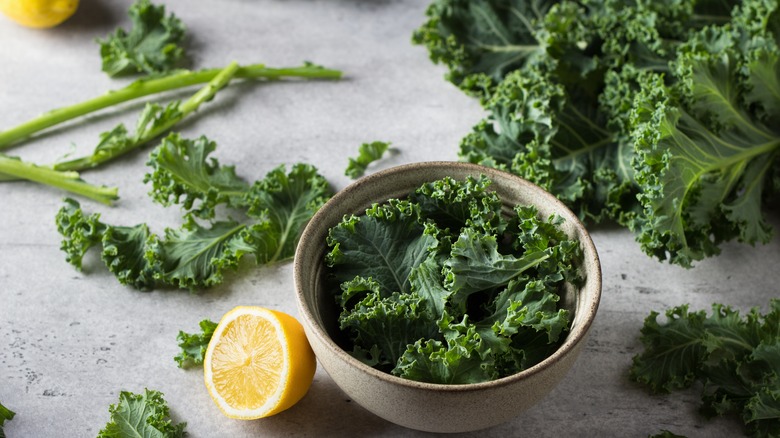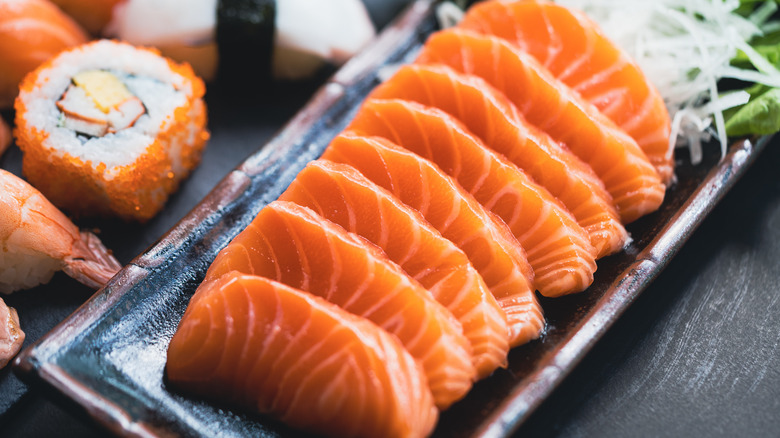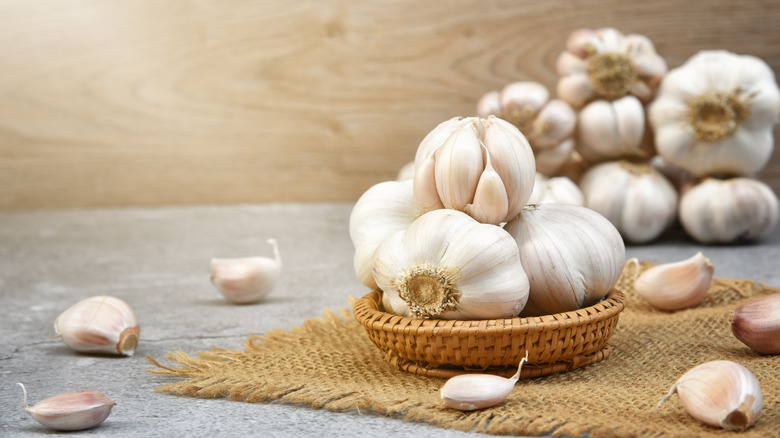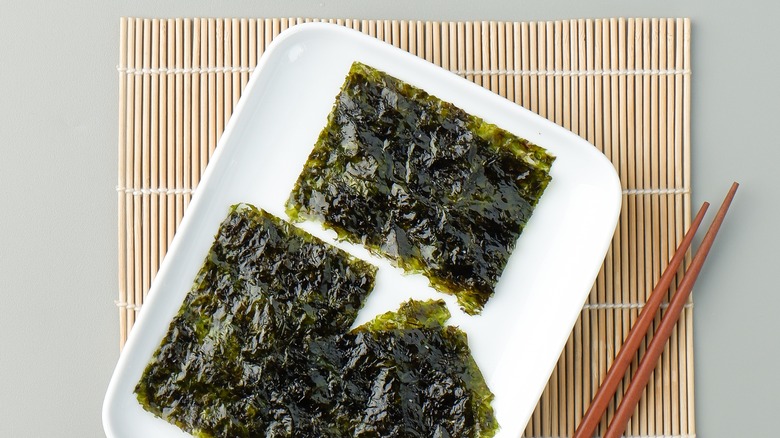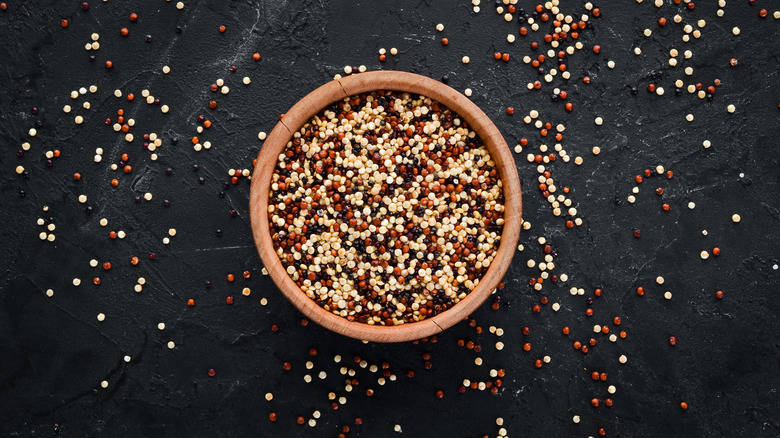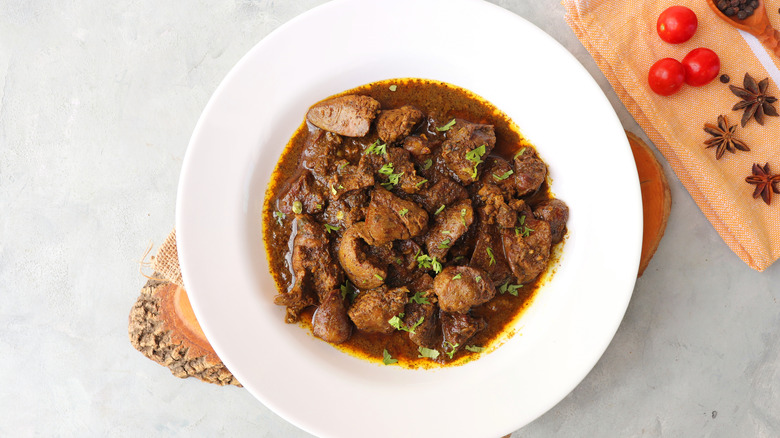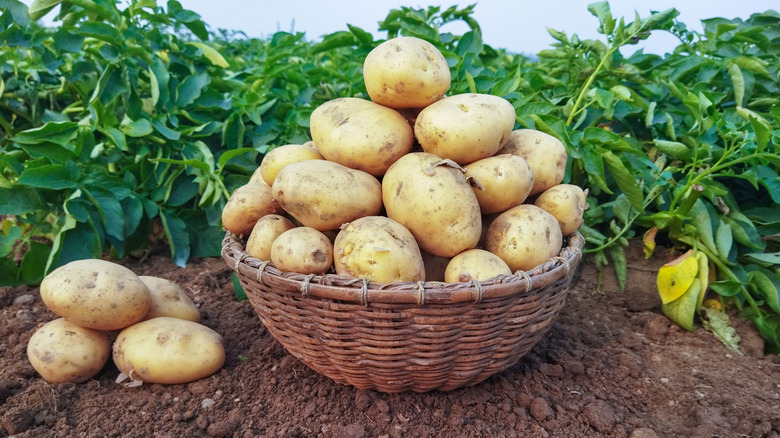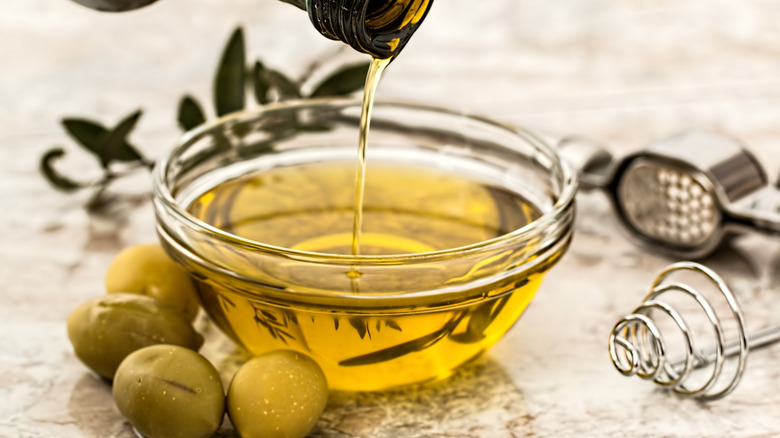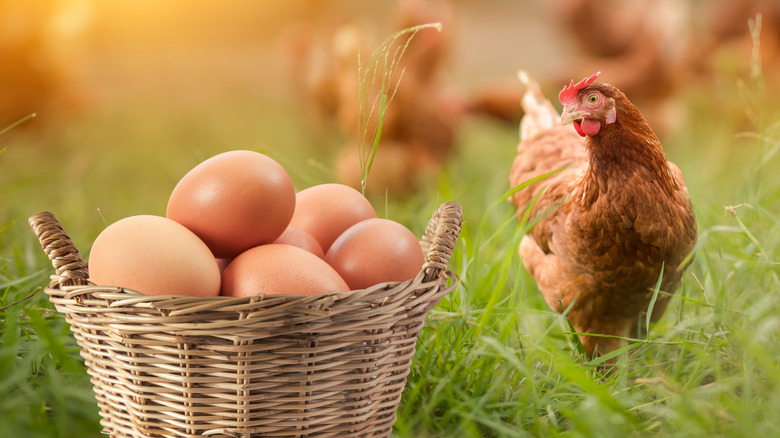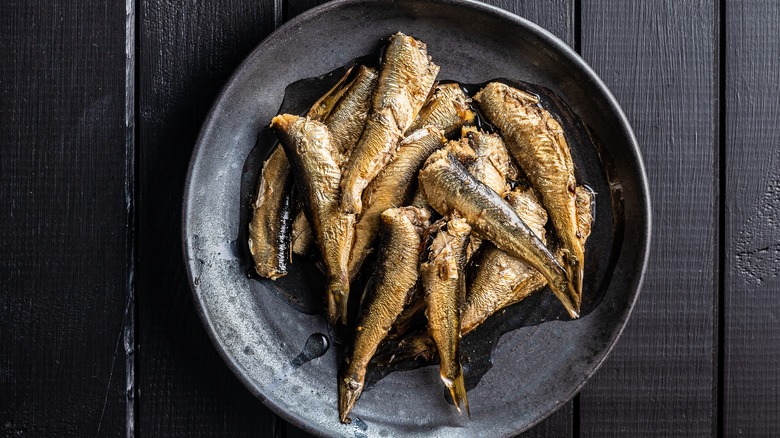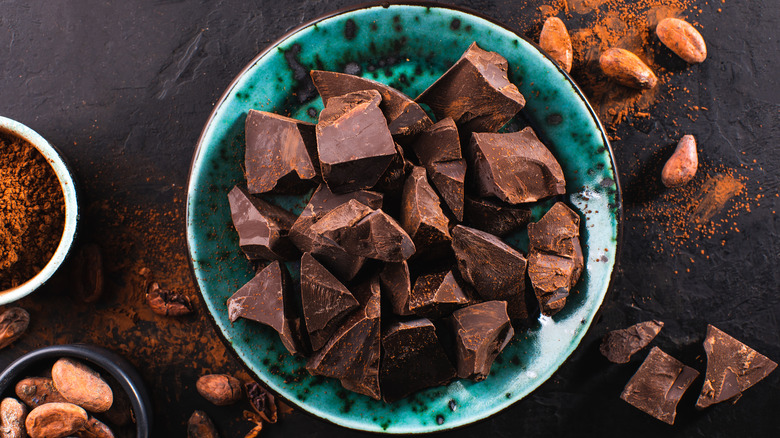14 Nutrient-Dense Foods You Should Add To Your Diet
Nutrient-dense foods are packed full of vitamins, minerals, and other goodies, to put it simply. When you think of the antithesis to nutrient-dense foods, you might think of donuts. Donuts are loaded with calories, fat, and sugar, but seriously lacking in the vitamin and mineral department. Nutrient-dense foods, however, are quite the opposite. These are foods that are often found in nature, tend to be lower in calories, and are "cherry" when it comes to providing your body with the fuel and other accoutrements it needs.
If you are looking to update your diet in the name of health, the entire concept of nutrient density might be a touchy one to stomach (pun intended). But if you break it down, you'll be seamlessly reaching for the more nutritious choices in no time. Plainly said: If you have two food items that both contain 100 calories yet one is comprised completely of refined carbohydrates in the form of sugar and the other is made up of unrefined carbs, fiber, and vitamins, the latter is the more nutritious option (via Heart).
Providing your body with the nutrients it needs is one way to be proactive when it comes to protecting your overall health. If you need a launchpad to get yourself going, here are some of the most nutrient-dense foods that you should start incorporating into your diet.
Kale
We know, we know — the last food item you want to see atop a list of nutrient-dense foods is kale. It's just so, uh, kaley. We get it, we do. However, your understanding that getting down with roughage for dinner sounds less enticing than a bacon cheeseburger does not negate the nutritional powerhouse that is kale. Not only will chomping on kale give you a good fiber boost, it also provides super important, bioactive compounds that can bolster your entire body's health and fight disease.
Kale contains vitamin C, vitamin A, vitamin B6, and vitamin K1. It provides your body with potassium, magnesium, calcium, manganese, and copper — plus a shot of antioxidants. The antioxidants that are in kale have been shown to fight cancer in lab settings, which is promising for humans, especially for those of us who love kale salads. To add to kale's primo profile, a one-cup serving of kale contains a scant 9 calories (via Healthline). This low caloric density combined with the huge amount of healthy compounds is why kale tops our list as one of the most nutrient-dense foods that you can add to your diet.
Salmon
Despite heavy-metal concerns surrounding fish, salmon is one of the more nutrient-dense foods that you can bless your body with. Salmon reigns supreme when it comes to providing your body with protein. A 3.5-ounce serving of salmon contains around 20 grams of protein. Protein is the main building block on which your cells are built, so consuming enough of it is definitely a priority. This protein comes served up with a side of uber-healthy fats of the omega-3 variety. Omega-3 fatty acids are thought to reduce your risk of heart disease by lowering your blood triglyceride levels. They are also thought to have a positive effect on numerous other health ailments (via WebMD).
Beyond the healthy fats and protein punch though, salmon contains vitamins and minerals that your body craves for healthy functioning. These vitamins include magnesium, potassium, and selenium, all of which play very important roles within your body. Salmon also provides your body with plentiful amounts of vitamin B12 and vitamin D (via Medical News Today).
Dandelion greens
We are going to take a bit of a left turn here to highlight the nutritional prowess of dandelion greens. Just to be clear, we are talking about the leafy part of the yellow weeds that pop up everywhere. Sure, kids like them, but adults know them to be weeds. Until now.
To be perfectly honest, dandelions are still weeds — they just happen to be weeds that provide epic health benefits. Dandelion greens might not be the most popular green out there, but they are definitely worth adding to your roster. Much like kale, a one-cup serving is low in calories while being high in compounds that allow your body to thrive. A serving of dandelion greens packs in only 25 calories, but nearly 2 grams of fiber, 1.5 grams of protein, and about 5 grams of carbs (via Verywell Fit). This size serving provides less than 1 gram of fat but a plentiful amount of vitamin A, vitamin C, vitamin E, and vitamin K. They also contain other healthy vitamins and minerals such as calcium, magnesium, potassium, and iron oxide (via Medical News Today).
Garlic
Vampires beware: Garlic is super healthy and nutrient dense! Raw garlic in particular is fascinating as it is known to have antibacterial and antifungal characteristics. Garlic packs in a ton of vitamins and minerals per clove, including calcium, copper, potassium, selenium, and manganese. This is in addition to the healthy amounts of vitamin C and vitamins B1 and B6. Garlic is also thought to have cancer-fighting properties, especially when it comes to colon and stomach cancer.
Most interestingly, garlic contains a mysterious substance called allicin, which is suspected to have a positive effect on cholesterol levels. Specifically, allicin is thought to lower levels of bad cholesterol while increasing the good kind. This is one way to work toward reducing your risk of developing heart disease (via Healthline). Mangia! Mangia!
Seaweed
If you are not on the seaweed-eating bandwagon, get on the seaweed eating bandwagon! If you're unfamiliar with seaweed as a food source outside of sushi, trust us, it's a delicious and highly nutrient-dense snack. According to Healthline, sea vegetables have the capacity to be more nutrient dense than land vegetables.
Seaweed contains a lot of anti-inflammatory compounds in addition to its copious amounts of magnesium, manganese, calcium, and iron. However, the real kicker when it comes to seaweed is iodine. Your body needs iodine, to the tune of around 150 micrograms per day, as explained by Healthline. Various types of seaweed contain differing amounts of iodine, with certain kinds providing your body upward of 2,000% percent of the recommended daily intake. Iodine is used by the thyroid to make hormones, so you could say it is very important. Even just munching on some high-iodine seaweed a few times a month can provide your body with the extra oomph it needs to keep rocking (via Healthline).
Quinoa
Quinoa seems to be king across the board when it comes to grain-like foods. Technically speaking, quinoa is classified as a pseudocereal, meaning that it is a seed that is most commonly prepared and consumed as if it is a grain. While quinoa provides mostly carbohydrates, behind the scenes it is full of other goodness your body needs. In addition to housing some protein and fiber, quinoa is a great way to get in more B vitamins, phosphorus, and magnesium (via Medical News Today).
Phosphorus is one of the most plentiful minerals found within the human body. It works with calcium to create strong bones and teeth, but it's also needed elsewhere for cellular function. Phosphorus can even help the kidneys with their filtration process (per Mount Sinai). Magnesium, on the other hand, helps your body create energy while also playing a role in your nerve function and muscular functioning (via the Mayo Clinic).
Liver
We get it. Your grandma from West Virginia might be the only person you know on earth who actually enjoys liver and onions. Perhaps she has even told you that this is her favorite meal while you try to hide your terror as she stirs a mysterious pot for dinner. If this is the case, don't be afraid to try something new. Liver is an epically nutrient-dense food, as are most organ meats. In Western culture in particular, we have grown accustomed to chowing down on muscle meats which are essentially devoid of nutrients when compared to organ meats.
In mammals, the liver is where many nutrients are actually stashed for later use. A 3.5-ounce serving of beef liver packs in nearly 30 grams of protein and impressive amounts of iron, zinc, phosphorus, and selenium. This size serving of beef liver contains 714% of the daily value (DV) of copper, 634% of the DV of vitamin A, and 201% of the DV of vitamin B2 (via Healthline). Many other vitamins are found in liver, but most impressively, a 3.5-ounce serving provides your body with 1,176% of the DV of vitamin B12. Holy cow!
Potatoes
Potatoes get a bad rap. After all, what is more beloved than fried potatoes in their many forms? Not much. It turns out, if you opt out of smothering your potatoes in oil and then frying them, they are actually really nutrient dense. A medium-sized baked potato including the skin contains nearly 4 grams of fiber and significant amounts of numerous vitamins. To be clear, much of the nutrient density of potatoes is housed by way of their skin, so removing the skin prior to preparing and consuming can decrease the healthiness of the standard spud.
Taking all of the vitamins and other healthy bioactive compounds in potatoes into consideration, they are thought to improve digestive health and your body's ability to regulate blood sugar. They contain antioxidants, which is an added way to hopefully help protect your body from cancer and other diseases as you age. Potatoes are also pretty filling, which is yet another reason why they are a great nutrient-dense food. After all, it feels great to load your plate and belly up with foods that provide a lot of healthy nutrients (via Healthline).
Extra virgin olive oil
Extra virgin olive oil might not seem like one of the most nutrient-dense foods you can eat, but the health benefits that have been linked to olive oil certainly yield pretty powerful health benefits. Extra virgin olive oil is so powerful because its main source of fat is the oleic acid it contains. Oleic acid is a substance that is known to help decrease the levels of inflammation in the body. What's more, oleic acid is thought to have positive effects on certain genes that are tied to cancer.
In addition to its amazing anti-inflammatory properties, extra virgin olive oil contains antioxidants in large quantities. Some of these antioxidants can help to neutralize blood oxidation, which may further lower your risk of developing heart disease. It also contains vitamin K and vitamin E. Even though olive oil is a fat, it has not been linked to obesity and weight gain. Rather, quite the opposite as extra virgin olive oil has been shown to aid in weight loss, help prevent Alzheimer's, and even reduce your risk of developing type 2 diabetes (via Healthline).
Greek yogurt
Chowing down on yogurt of the Greek variety is a great way to add more nutrient density into your diet. Greek yogurt is different from other yogurts because it is processed in such a way that the lactose-containing whey is removed. This also significantly cuts down on the amount of sugar per serving, which is definitely a health benefit. Greek yogurt is super high in calcium, protein, probiotics, iodine, and vitamin B. All of these compounds are highly necessary within your body, though they perform wildly different functions.
The calcium and protein found in Greek yogurt can help support strong bones, which is pretty essential considering that your skeleton is literally the backbone of your body. The probiotics found in Greek yogurt can help regulate and bolster your healthy gut bacteria, which can ultimately lead to better gastrointestinal functioning overall. Probiotics are now being touted as a great way to serve your mental health, as they are thought to play a role in the relationship between the gut, brain, and certain neurotransmitters (via Medical News Today).
Eggs
Eggs are a total superfood, and we aren't saying that lightly. Eggs truly are one of the most nutritious foods because they contain a small amount of almost every nutrient that your body needs, as explained by Healthline. To be clear, eggs are still pretty high in cholesterol, but they are not typically a cause of increased cholesterol. In fact, eating the cholesterol found in eggs may actually trigger a reaction in your body that balances out the cholesterol created by your body.
One hard boiled egg contains 6 grams of protein and 5 grams of healthy fats in addition to a lengthy list of vitamins and minerals. Eggs contain a whole bunch of B vitamins, vitamins E, D, and K. They also contain phosphorus, calcium, selenium, and zinc. Eggs have more than 100 milligrams of choline each, which is a nutrient that your body needs in order to build the membranes of your cells (via Healthline).
Sardines
Much like salmon, sardines are an oily fish that deserve a spot on your weekly dietary roster because of how much nutrition they contain in one small package. And when it comes to sardines, the package is even smaller. Sardines contain plentiful amounts of heart-healthy omega-3 fatty acids, as well as other vitamins and minerals.
Sardines are interesting because you typically eat the entire thing in one go. Since we already know that organ meats are a bit more nutritionally-dense than muscle meats, it makes sense that munching an entire miniature fish would provide your body with all of the nutrients contained in that fish's tiny body (via Healthline). One serving of four sardines provides your body with 12 grams of protein and 5 grams of mostly healthy fat. Additionally, they contain iodine, selenium, phosphorus and calcium. Enjoying sardines as a snack or as part of a meal will also provide your body with a smattering of super valuable B vitamins (via WebMD).
Dark chocolate
Naturally, we saved the best for last. After all, who doesn't like to be reminded about how exceptionally healthy eating dark chocolate is? Dark chocolate is often regarded as a health food because of the amount of antioxidants it contains, but there is more to these processed cacao seeds than just that. When picking out a chocolate bar, opt for one that contains upward of 70% cocoa for maximum benefits.
If you do so, a 100-gram serving will provide your body with 11 grams of fiber, which is a pretty excellent start. This same size serving will also give you nearly 70% of the DV of iron, nearly 60% of the DV of magnesium, around 90% of the DV of copper, and a whopping 98% of the DV of manganese. However, a 100-gram serving is a really hefty serving size that should not be consumed every day. In moderation, dark chocolate can be a great nutrient-dense food to add into your diet. It even contains some of that anti-inflammatory oleic acid, just like olive oil (via Healthline).


